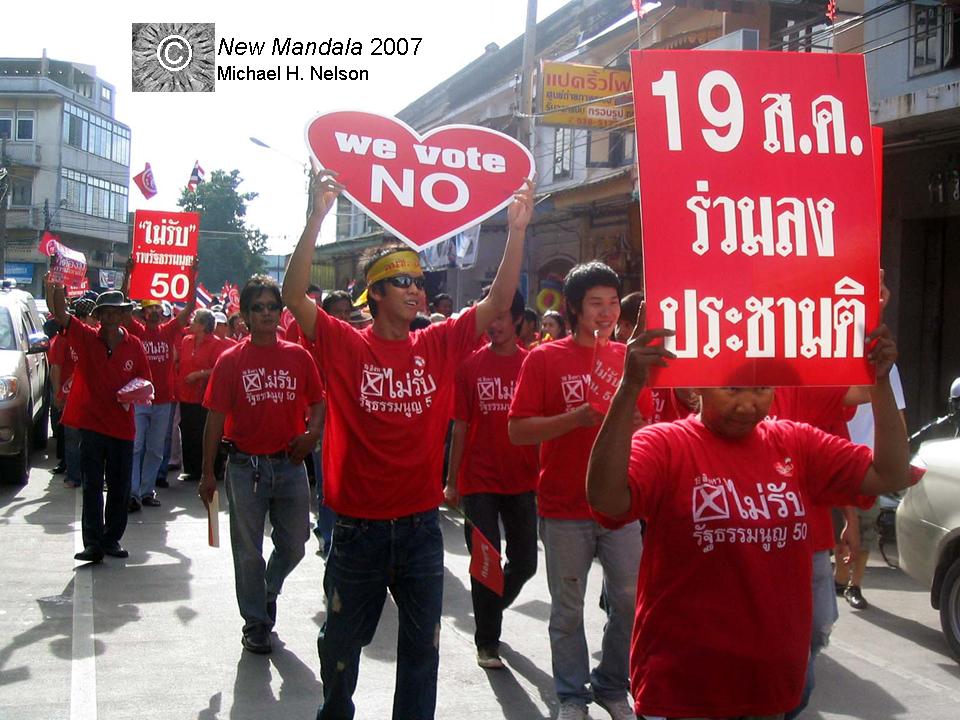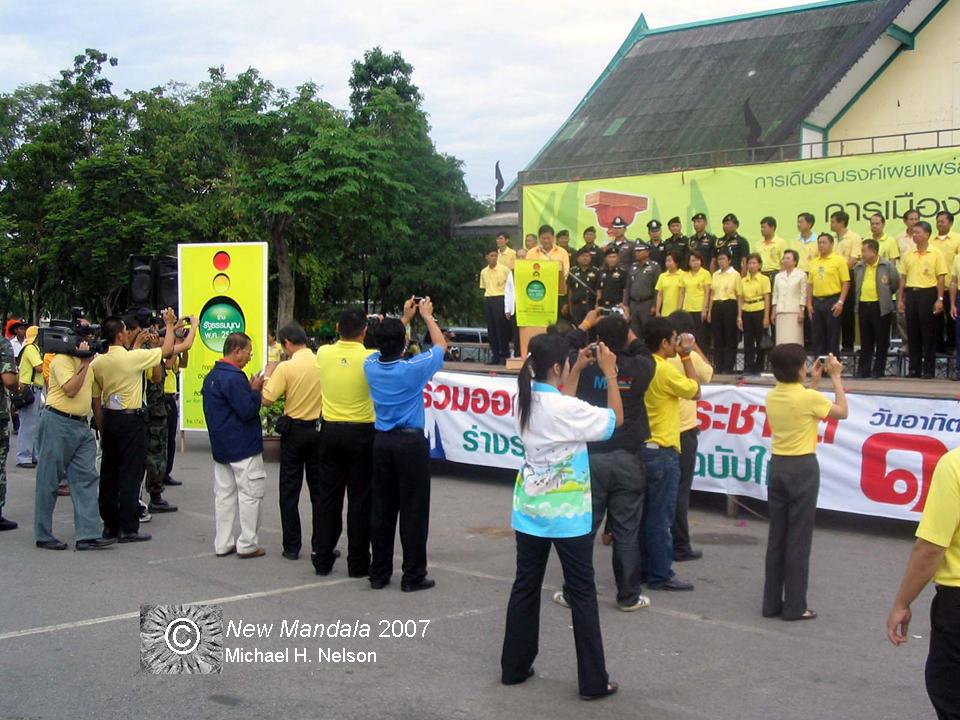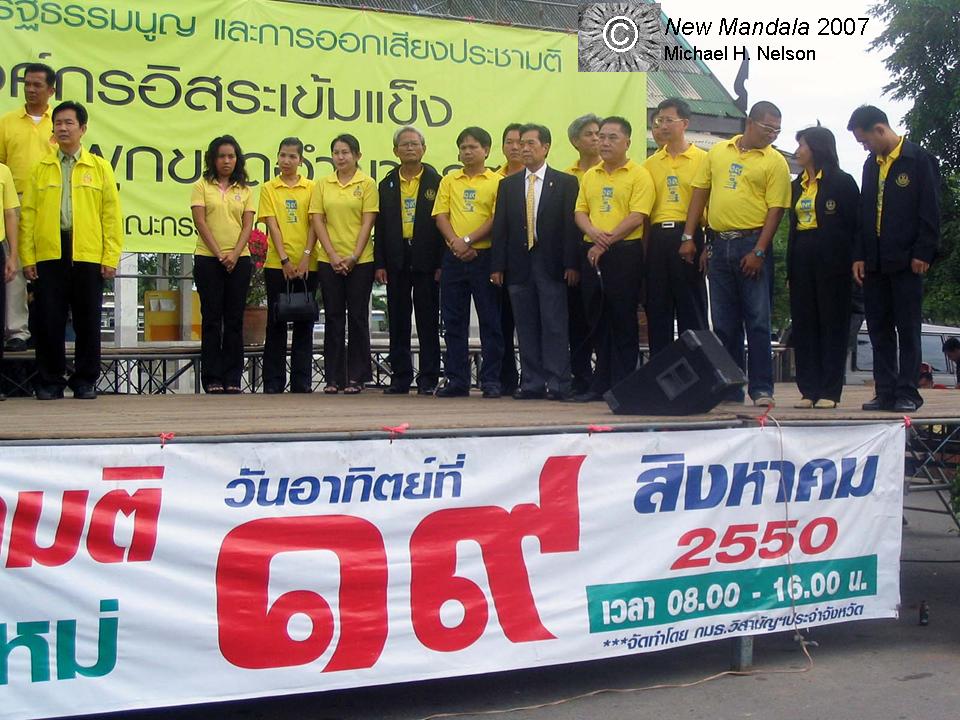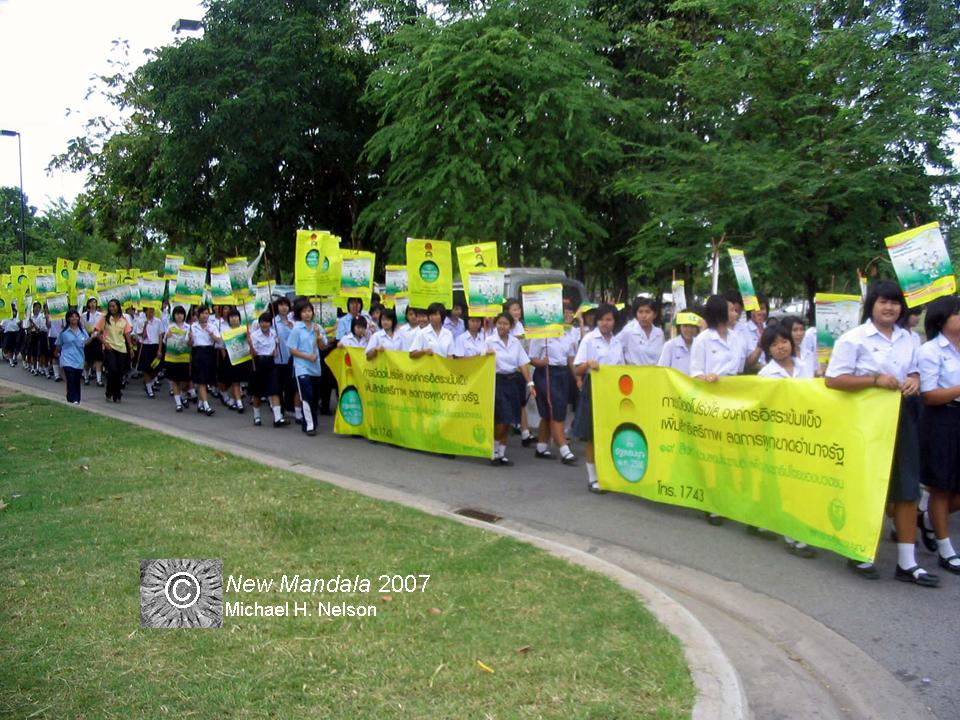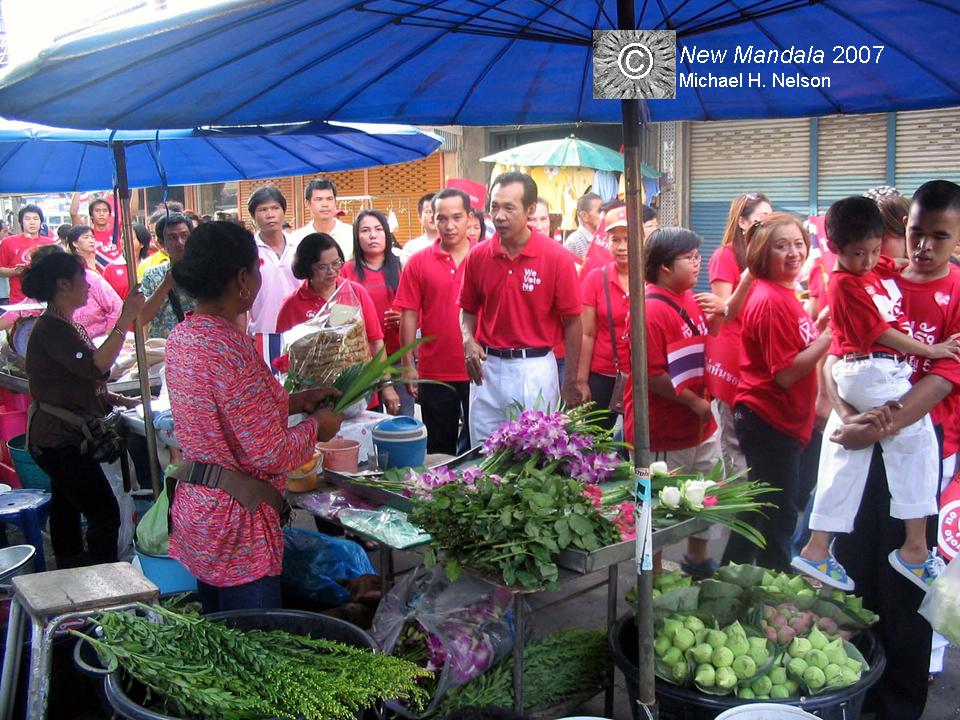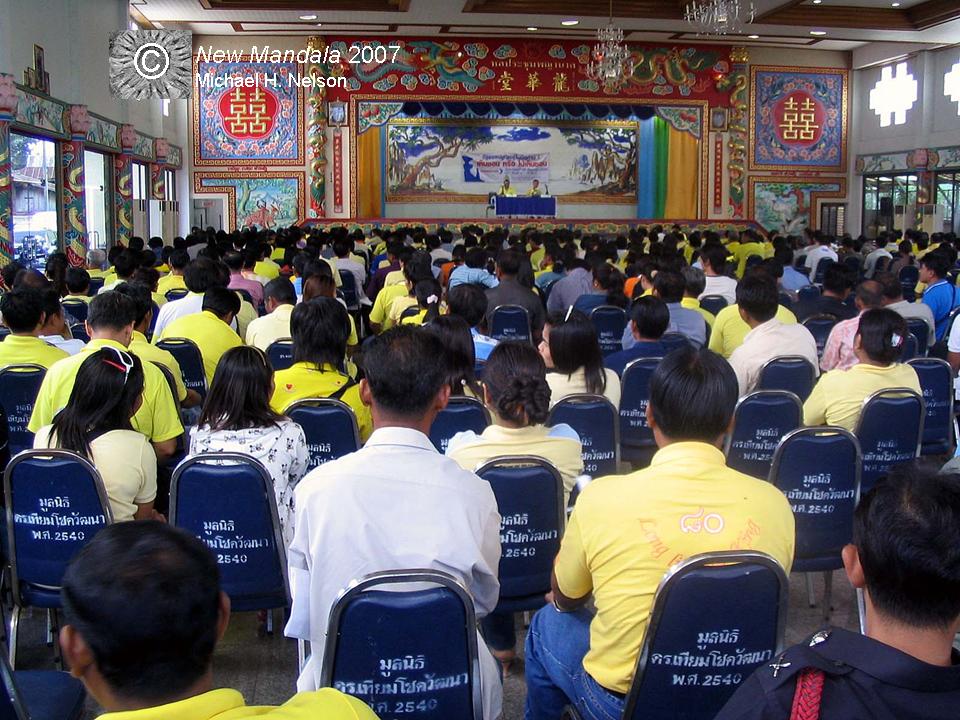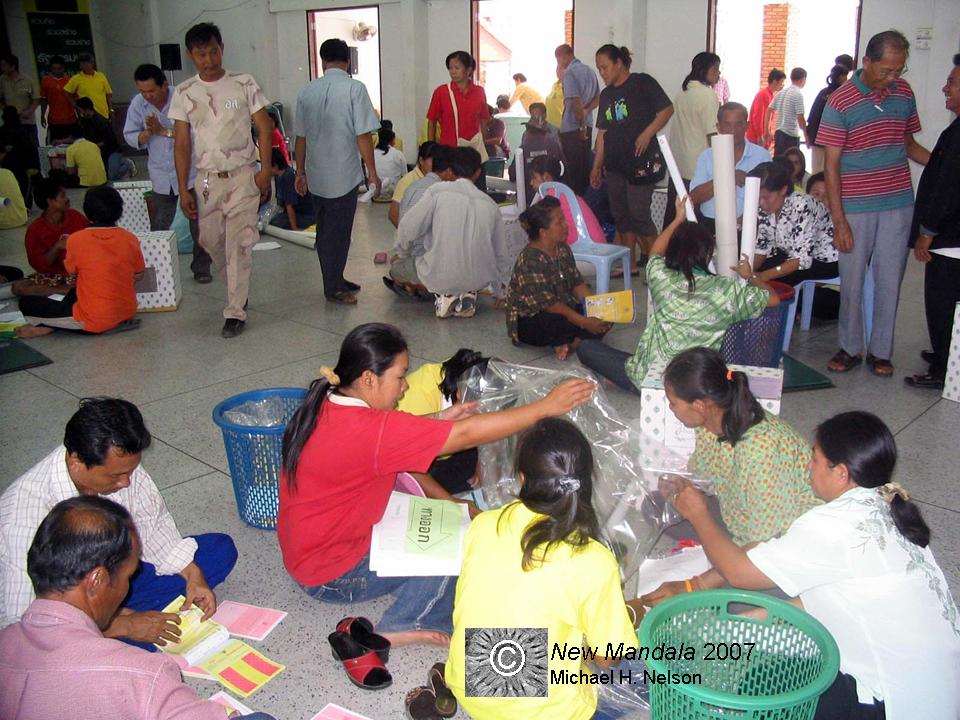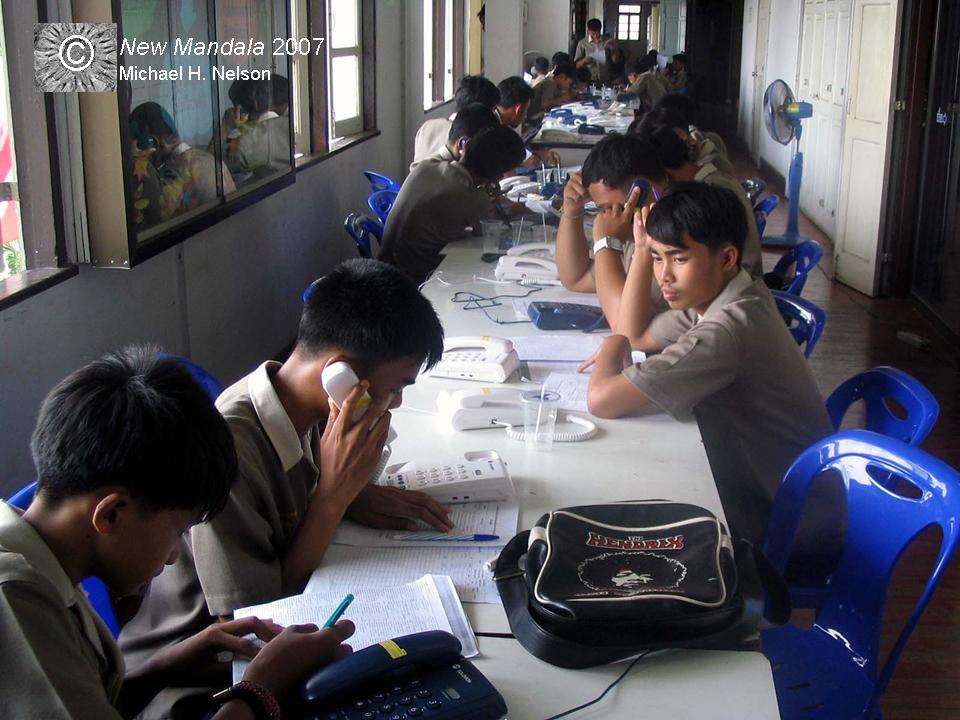This post is part of New Mandala’s month-long feature on Thailand’s constitution referendum. The referendum will be held on 19 August 2007.
Image 1: Anti-constitution rally
As one might expect, the last days before the referendum saw a flurry of activities. On Friday, the Constitution Drafting Assembly’s (CDA) provincial branch brought together hundreds of students from a number of state schools, a private one, and soldiers in order to sell the draft constitution to the people–rather than merely urging them to use their voting rights. As usual, the main selling points were political transparency, strong independent organizations, more rights and liberties, and the reduction of the state’s political monopoly. The opening of the event took place opposite the provincial hall and was presided over by the provincial governor (Image 2). While he was speaking, the provincial CDA listened attentively (see Image 3). After the opening, the schools split and walked different routes through the municipality (Image 4) carrying pro-constitution banners and posters, and distributing the CDA’s promotional leaflets.
Image 2: Referendum rally
Image 3: Listening attentively
Image 4: Students marching in Chachoengsao
Having seen that this was basically a state-sponsored event to push the acceptance of the constitution, and after the governor had praised it in his speech, it was a little surprising to hear him saying that civil servants had to be strictly neutral. Less surprising was that this was yet another “yellow” event. It seems that the state sector has been trying to link the voting in the referendum, if not the acceptance of the draft constitution, with the peoples’ loyalty to the King. A TV spot featuring the Election Commission of Thailand’s chairperson showed the King’s 80th birthday emblem with the remark that using one’s voting right was like extending one’s best wishes to the King.
In the current political climate, the opposition obviously has had a hard time. I had a long talk with former Thai Rak Thai MP Wuthipong Chaisaeng. On my question concerning the Chaisaeng family’s lack of anti-constitution campaigning, except for Chaturon’s appearances at a number of national-level events, he said that he had also thought of doing some campaigning on a car with a loudspeaker system. However, these were not democratic times. He did not want to provoke the military and police by doing anything openly. Moreover, he had to think about what might happen to those who would participate in those activities. There might be some sort of check bin (here in the sense of negative consequences). The kamnan and village headmen did not dare do anything, because they knew they were being watched. Therefore, he had only talked to some groups of local leaders, especially on the occasion of his recent birthday, when they came to congratulate him. He visited a number of districts to deliver brief speeches, one of which was filmed by a soldier.
Anyway, one day after the “yellow” affair in front of the provincial hall, the Chaisaeng’s staged their “red” “vote no” rally through some sectors of the municipality. Shortly before 7:00 in the morning, they assembled in the compound of the Chaisaeng family home (Image 5; to the rights is former TRT MP Thitima Chaisaeng, Wuthipong’s sister; the boy in the middle is his son).
Image 5: The Chaisengs rally
Their main target area was the huge fresh food Bo Bua market, where they distributed their anti-constitution leaflets, put small no-vote stickers on the vendors’ dresses, and briefly talked with them (see Image 6; Wuthipong Chaiseng is in the middle).
Image 6: At the Bo Bua market
Altogether, 200 people took part in this event, which ended after around three hours. The participants’ social-occupational composition was similar to what one sees at the Democratic Alliance Against Dictatorship rallies at Sanam Luang (see Image 1).
Meanwhile, the peoples’ opinions on the constitution and the referendum continue to be varied. My main impression actually is that they somehow have no real clue what they were supposed to make out of all this. The referendum did not seem to be high on their everyday agenda. I could easily talk with acquaintances about other things. But when asked about the referendum, they seemed to run out of ideas. Here are some voices: The director of a school thought that most people would vote for the draft constitution, because they wanted to return to normalcy. A market vendor in Bang Nam Prioew exclaimed that, “I am bored – Thai politics is in such a turmoil!” She repeated this to make sure I got it. Another acquaintance suggested that people are not that aware of the referendum. She thought that many people would simply stay home. Of those who will vote, most might vote in favor of the draft in order to move on to an election. The female owner of a Kodak shop where I used to buy my slide films said that people will have to accept the draft constitution in order to get an elected prime minister again. A one-time provincial councilor came close to the official line, saying that he will accept the constitution, because money reigned supreme in Thai democracy. To the outside world, a military coup might seem a bad thing. However, he had in fact not lost any of his rights. Rather, the coup was necessary to prevent a network of relatives [like the Shinawatra clan] from taking absolute control of the country. That the government did not allow the opponents of the draft constitution any space for campaigning for their point of view was all right, because the old power clique had to be obstructed. Luckily, Thailand had its King–without him, chaos would prevail. Finally, I visited a nurse/teacher couple, who I have known for many years. While the wife thought that accepting the draft constitution would lead to a return of democracy, her husband disliked the way the draft was being imposed on him. He wanted to have a “no vote” box to be able to show his disagreement. Besides, until now it had not yet been proven that Thaksin really had committed any corrupt acts. And corruption was what he strongly disliked with politicians and civil servants.
Of course, the provincial election commission has also been busy. It organized training for the members of polling station committees (Image 7), followed by these committees thoroughly checking their electoral utensils on Saturday, for example in the meeting hall of Bang Nam Prioew district (Image 8).
Image 7: Training meeting
Image 8: Prepraring voting materials
They then took the ballots, the ballot boxes, the polling booths and other material with them to store them at safe places, from where they will retrieve them on Sunday morning in order to open their respective polling stations at 8:00. One innovation is that the Election Commision of Thailand has issued a “direct sale” policy for the referendum. Students were recruited for five days to call thousands of voters at home to ask them whether they knew that a referendum would take place on August 19, and whether they intended to cast their votes (Image 9).
Image 9: Working the phones
They did not ask how people would vote nor did they suggest how they should mark their ballots.
 Facebook
Facebook  Twitter
Twitter  Soundcloud
Soundcloud  Youtube
Youtube  Rss
Rss 